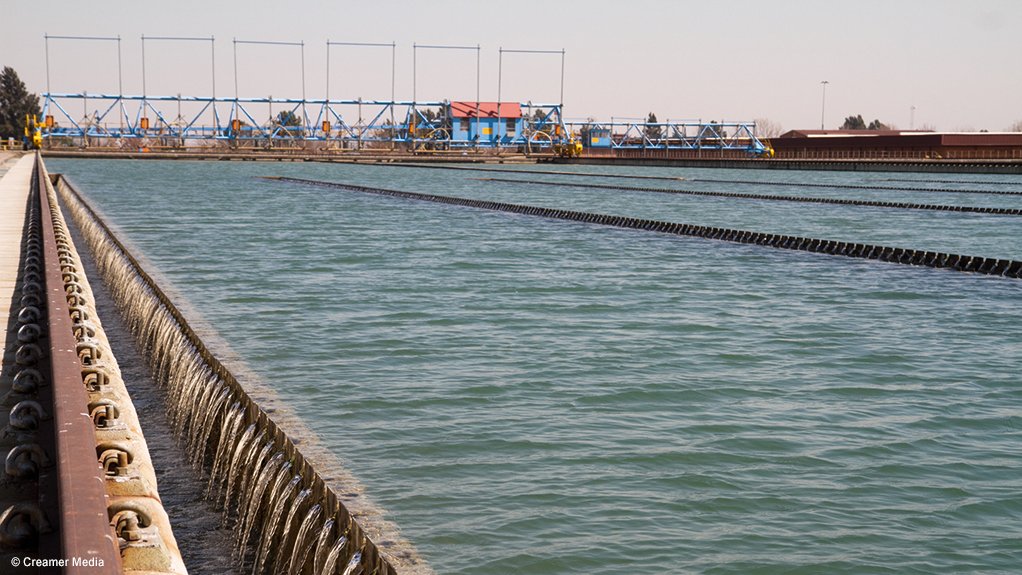Indaba explores water infrastructure challenges, opportunities


Rand Water is focused on augmenting and rehabilitating existing infrastructure, among other initiatives
Photo by Creamer Media
South Africa has shifted from a water-stressed to a water-scarce country over the years and faces several water infrastructure challenges; however, there are initiatives and opportunties to mitigate this, including through the participation of the mining industry.
This was highlighted by speakers during industry body Consulting Engineers South Africa’s (Cesa’s) Infrastructure Indaba, held this week in Fourways, Gauteng.
During a session on March 19, titled 'Infrastructure and Water and Energy Security', Institute of Municipal Engineering of Southern Africa president Geoff Tooley pointed out that, while it was important to protect water and develop new technologies to augment it, it was also crucial to design resilience into water infrastructure to ensure it was sustainable and could withstand the impacts of climate change.
Some solutions proffered included evaluating the risks surrounding water infrastructure project, for example, flooding, erosion and landslides.
There was also the option of managing urban rivers. Tooley pointed out that a riverine management programme presented a cheaper option than replacing infrastructure.
Moreover, debris walls can be installed to reduce blockage risks and roads can be deigned to withstand overtopping.
Tooley also advocated for regular inspections and maintenance of infrastructure.
He stressed the need to properly evaluate all the risks when designing infrastructure, learning from previous disasters, and accounting for the impact of climate change on the asset that was being designed to last 50 to 100 years.
Tooley also indicated the need to engage roads and stormwater engineers.
Rand Water master planning senior manager Aubrey Jabulani Nxumalo informed that the entity was implementing major upgrades and expansion programmes.
The bulk water utility had a board-approved capital expenditure for infrastructure augmentation and renewable programme, amounting to just over R27-billion, scheduled to run from the this year to the 2029 financial year, he highlighted.
This would focus on augmenting, replacing and rehabilitating existing infrastructure; as well as on implementing alternative sources of raw water and clean energy.
Nxumalo pointed out that this programme involved complex engineering challenges, from designing new pipelines and treatment plants to implementing water and energy-saving technologies.
Rand Water was leveraging the specialised expertise of consulting engineers to ensure that these projects were executed efficiently and effectively, Nxumalo said.
He explained that because the entity was focused on alternative raw water sources and clean energy, this required innovative approaches and collaboration with experts in these fields. The entity relied on consulting engineers to provide forward-thinking solutions that aligned with Rand Water’s sustainability goals.
Nxumalo stressed the entity’s focus on building strong partnerships for effective project delivery, collaborating with government agencies and other stakeholders.
Meanwhile, Minerals Council South Africa CEO Mzila Mthenjane posited that the mining industry was showing itself as a critical partner for water infrastructure, partnering with the Department of Water and Sanitation to do so.
He pointed out that the industry only consumed about 4% to 5% of South Africa’s water, and was an active provider of water to nearby communities, for example, the financial and technical support to the Vaal Gamagara water supply scheme in the Northern Cape.
He highlighted that public-private partnerships, when undertaken with clear intentionality, had proven successful.
Mthenjane emphasised that the mining industry could play a key role in infrastructure development in the country and on the continent.
He averred that further to the calls to turn South Africa into a construction site, was the need turn the country into an exploration site, which would engender infrastructure development, owing to the virtuous relationship between mining and infrastructure development.
Article Enquiry
Email Article
Save Article
Feedback
To advertise email advertising@creamermedia.co.za or click here
Press Office
Announcements
What's On
Subscribe to improve your user experience...
Option 1 (equivalent of R125 a month):
Receive a weekly copy of Creamer Media's Engineering News & Mining Weekly magazine
(print copy for those in South Africa and e-magazine for those outside of South Africa)
Receive daily email newsletters
Access to full search results
Access archive of magazine back copies
Access to Projects in Progress
Access to ONE Research Report of your choice in PDF format
Option 2 (equivalent of R375 a month):
All benefits from Option 1
PLUS
Access to Creamer Media's Research Channel Africa for ALL Research Reports, in PDF format, on various industrial and mining sectors
including Electricity; Water; Energy Transition; Hydrogen; Roads, Rail and Ports; Coal; Gold; Platinum; Battery Metals; etc.
Already a subscriber?
Forgotten your password?
Receive weekly copy of Creamer Media's Engineering News & Mining Weekly magazine (print copy for those in South Africa and e-magazine for those outside of South Africa)
➕
Recieve daily email newsletters
➕
Access to full search results
➕
Access archive of magazine back copies
➕
Access to Projects in Progress
➕
Access to ONE Research Report of your choice in PDF format
RESEARCH CHANNEL AFRICA
R4500 (equivalent of R375 a month)
SUBSCRIBEAll benefits from Option 1
➕
Access to Creamer Media's Research Channel Africa for ALL Research Reports on various industrial and mining sectors, in PDF format, including on:
Electricity
➕
Water
➕
Energy Transition
➕
Hydrogen
➕
Roads, Rail and Ports
➕
Coal
➕
Gold
➕
Platinum
➕
Battery Metals
➕
etc.
Receive all benefits from Option 1 or Option 2 delivered to numerous people at your company
➕
Multiple User names and Passwords for simultaneous log-ins
➕
Intranet integration access to all in your organisation



















